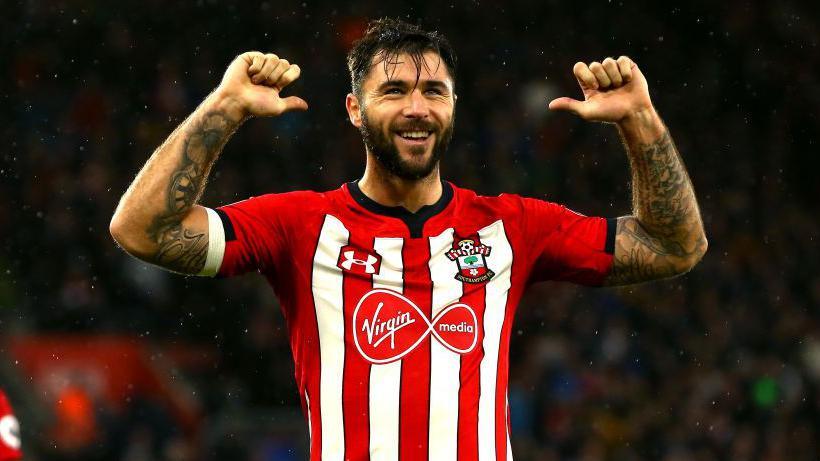Ex-Saint Austin on ADHD diagnosis - 'life is great'

Charlie Austin played for Southampton in the Premier League
- Published
Former Southampton striker Charlie Austin said he was "shocked" after finding out he had ADHD but that now he knows, "life is great".
Austin, 35, said after both his daughters were diagnosed with ADHD and autism he wanted to know more about the challenges they face to "be the best parent possible to help them".
"The more I learnt about ADHD the more I thought, 'this sounds a bit like me'," he wrote on X, external.
"I have always been impulsive, I moved my family to the other side of the world before visiting the country, and I say things as they are and I see them."
Attention deficit hyperactivity disorder (ADHD) is a condition that affects people's behaviour.
Those who have it can seem restless, may have trouble concentrating, and may act on impulse.
Austin, who also played for Swindon Town, Burnley, QPR and West Bromwich Albion, as well as a spell with Brisbane Roar in Australia, said the diagnosis still came as a "major shock" despite his suspicions.
"Eighteen months ago after discussions with my wife and best friend I decided to see a professional," he wrote.
"After many assessments I was diagnosed with combined ADHD, scoring high in hyperactivity, impulsivity and inattentiveness.
"I went through all the emotions, confusion, upset and anger, how different could life have been if the diagnosis was at 20 instead of 34."
Austin said his consultant recommended taking medication to treat the condition but the medications were on the World Anti-Doping Agency (Wada) prohibited list and so it "wasn't an option whilst playing professional football".
He signed for seventh-tier side AFC Totton in July and said that he is now four months into using medication and that "life is great".
"People always say there is no point getting a diagnosis in adult life - they couldn't be more wrong. It really is the best choice I've made."
'We need to get them diagnosed'
Austin says four current footballers and three former players have contacted him since he went public with his condition.
He believes more can be done to support players in receiving the correct diagnosis and appropriate treatment.
He told BBC Sport: "They basically just said, 'you've just read out what I've got, what I've been going through for the last five, six years. It sounds like you've just read out my life, not just yours.'"
"There was definitely so many people out there that have the same symptoms.
"We need to get them diagnosed. If they are successfully diagnosed with ADHD then the medication that they are prescribed they should be allowed to take.
"We talk about mental health, not only football but in the world. I am certain that this [ADHD] is a really big part of not just football, but all sports".
- Published16 August
